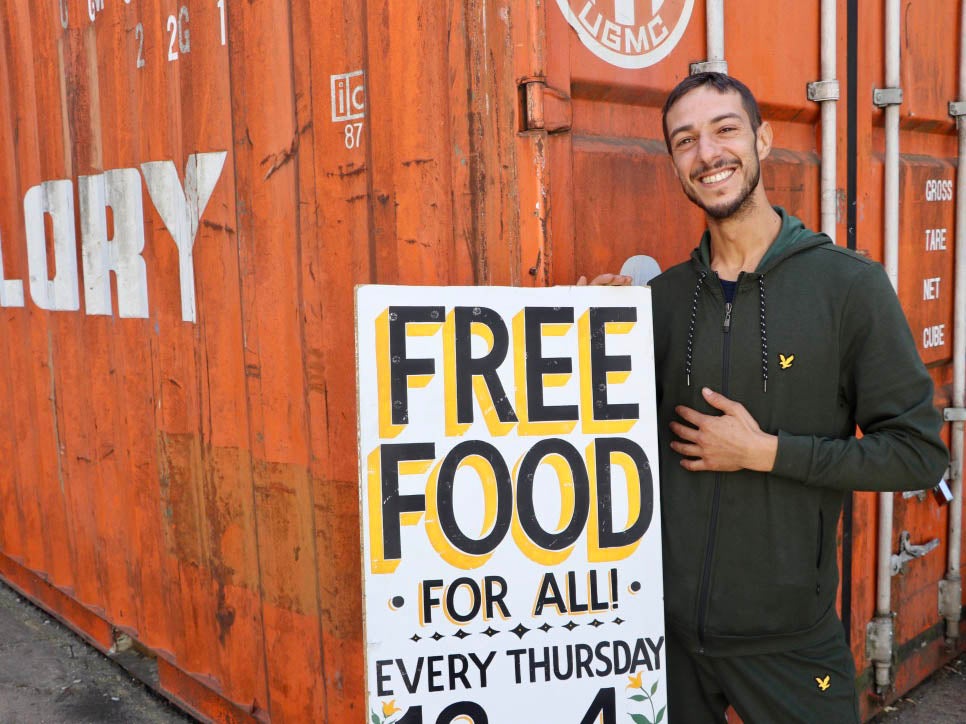Edible London: Fighting food poverty during the pandemic, one meal at a time
Chantal Da Silva meets the volunteers running an initiative that provides 600 free, nutritious meals every week


Tucked away down a side street in the London borough of Haringey, Edible London’s “free food” stand might be difficult to find were it not for the mouthwatering scent of Carribean food drawing people in.
Of course, having “free food” signs posted up around the neighbourhood also helps, particularly at a time when the promise of a free lunch might sound too good to be true – in the middle of a pandemic that has left hundreds of thousands struggling to put food on the table.
Yet a free lunch is exactly what the dozens of volunteers behind Edible London – an organisation aimed at addressing and raising awareness around food poverty – are working to provide. Thousands of delicious and nutritious meals have been served up to Haringey residents from all walks of life since the pandemic began.
Every Thursday afternoon, Edible London distributes up to 600 healthy meals to anyone who approaches their stand, with no questions asked.
All of food is crafted with nutritional needs in mind, in addition to being vegan, which ensures that “everyone is welcome”, said Sunny Karagozlu, the founder of Edible London.
“We work with a diverse community, and with diversity, you have to be able to open your doors to everyone,” Karagozlu added. “Our food is for everyone.”
What is food poverty?
When Karagozlu first launched Edible London in March 2018, he did so to help his community understand exactly what food poverty is and just how easily anyone can become affected by it.
“Food poverty doesn’t necessarily mean people can’t go to the supermarket and do shopping,” he said. “What food poverty actually means, at least, in my opinion, is that the nutritional food that is available out there is way too expensive for anyone earning a normal wage.”
Now, in the middle of the pandemic, he said, awareness of food poverty is more important than ever, with a growing number of people struggling to feed themselves and their families.
For many in the area, Edible London’s weekly initiative, which is hosted outside The Highway House Shelter, an organisation that provides shelter, food, counselling and companionship to those in need, is a lifeline.
‘It’s a hard time’
“People come here and they say, ‘thank you for what you’re doing. If it wasn’t for this service, we wouldn’t be eating tonight’,” Karagozlu said.
For Angeli, a 32-year-old domestic worker from the Philippines who balances working with raising her daughter, Snow, who is nearly two, Edible London’s meals have been a salvation.
“It’s amazing,” said Angeli, who asked that her last name be withheld. “It helps people who can’t eat and who can’t buy food. It’s very helpful.”
Finding support during the pandemic has been difficult, she said. “I’m scared because of my situation and I need to be able to go out and to get food.”
With Edible London volunteers giving Angeli six meals to take home on Thursday, she said she would be able to eat for the week. However, she said she planned to stretch out each dish over a number of meals.
It takes a village
While the group raised more than £51,000 in donations from 456 supporters in just 61 days through an online Crowdfunder page to support its coronavirus response, Karagozlu said the backing of dozens of volunteers, organisations and companies has really fuelled the initiative.
The Highway House Shelter’s chief executive, the Rev Alex Gyasi, has offered a space for Edible London to distribute its meals. Meanwhile, companies such as Caribbean catering provider Island Flavours have been unsung heroes, with co-director Jax Joseph personally cooking and donating dozens of meals for one of the distributions.
“It’s for a good cause, so I just offered my time,” Joseph said. “For today, I did about 130 Caribbean meals.”“I have a belief in the idea that people should be able to eat properly and if I can give a day a week, then I’m happy to do so,” he said.
Gyasi said it was important to remember that anyone can “fall on hard times”, particularly during times like these, when the unemployment rate in the UK has inched closer to the highest it has ever been.
According to the most recent data from the Office for National Statistics (ONS), therate for May to July stood at around 4.1 per cent, rising from 3.9 per cent.
That data is based on past surveys, however, and does not reflect the most up-to-date reality of the situation. The number of people claiming benefits suggests that unemployment could be much higher, with the March-August figure surging 120 per cent to 2.7 million, according to the ONS.
Food poverty, Gyasi said, “can happen to anybody”, whether they have been unemployed for some time or have suffered because of these unprecedented times.
Karagozlu said he hoped growing awareness of food poverty would mean organisations such as Edible London gaining more support from the government and the corporate sector.
“I try to correlate everything back to plants,” he said. “And your community are your plants, they are your family. They’re there for you to look after. If you don’t water your plants for a couple of weeks, they’ll be finished.” And he added: “You’ve got to constantly love and cherish your community.”
Visit Edible London’s website for details of its coronavirus response
Join our commenting forum
Join thought-provoking conversations, follow other Independent readers and see their replies
Comments

Bookmark popover
Removed from bookmarks